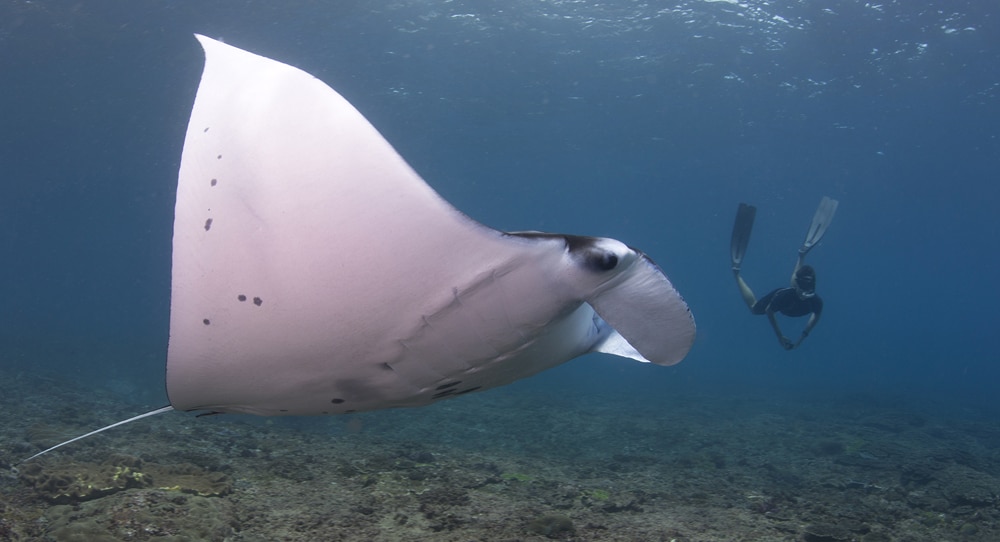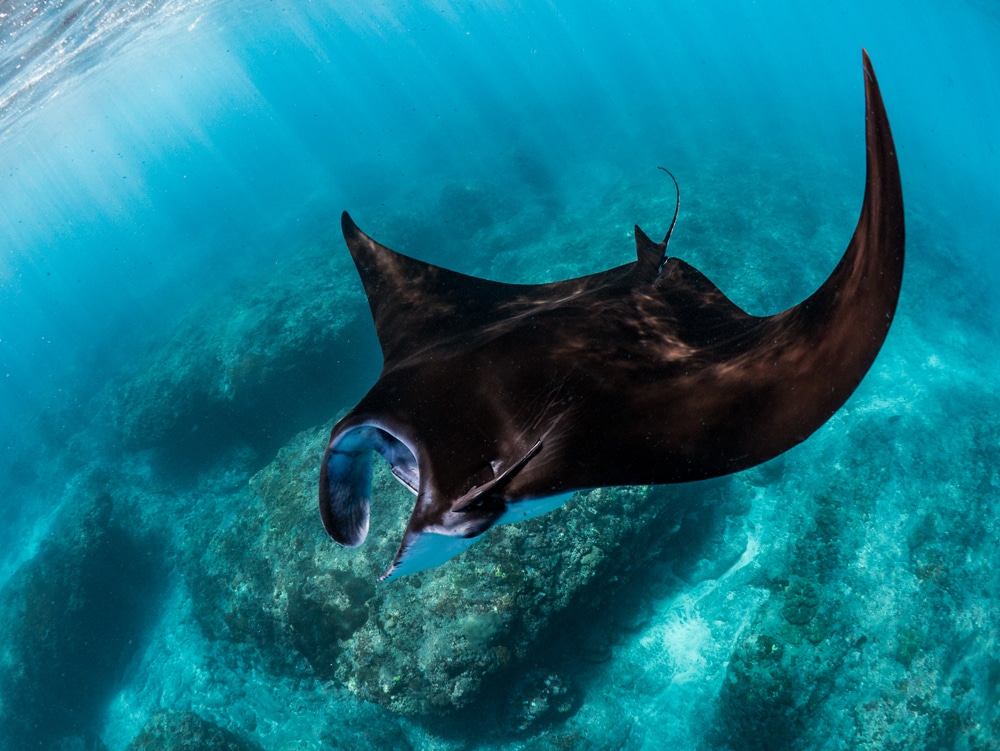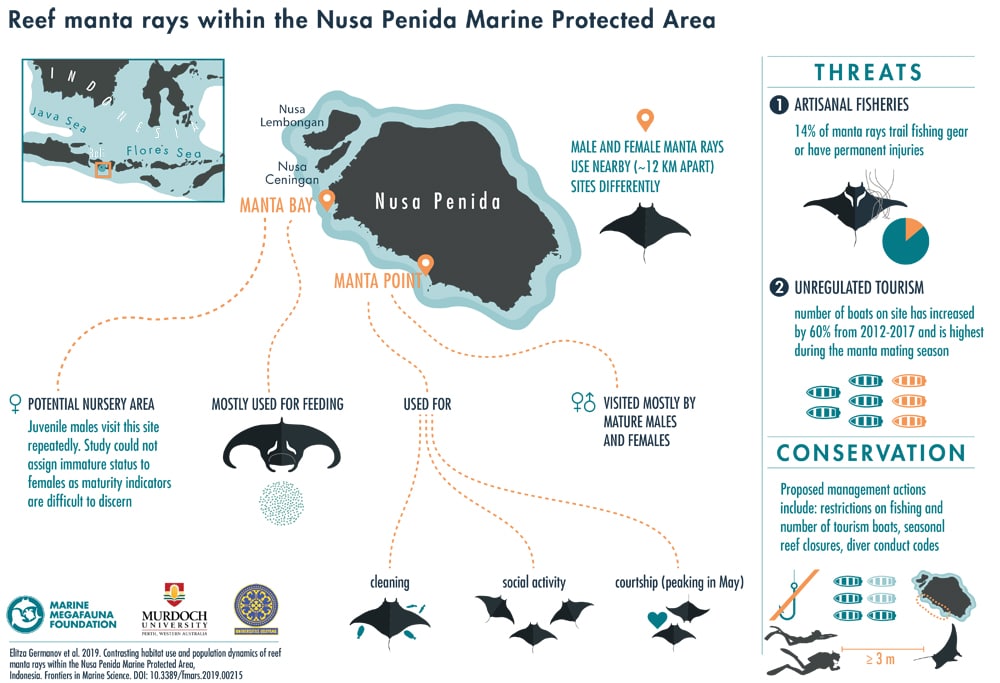Marine Life & Conservation
Tourists key to future of rare manta nursery

 Scientists from the Marine Megafauna Foundation and Murdoch University are reporting a large number of juvenile manta rays in the waters of Nusa Penida, a small island 18km southeast of Bali, suggesting the area may be a nursery for this threatened species.
Scientists from the Marine Megafauna Foundation and Murdoch University are reporting a large number of juvenile manta rays in the waters of Nusa Penida, a small island 18km southeast of Bali, suggesting the area may be a nursery for this threatened species.
Reef mantas (Mobula alfredi), which grow up to 5m, tend to reside and feed in shallow, coastal habitats. They also visit ‘cleaning stations’ on coral reefs to have parasites or dead skin picked off by small fish. In Nusa Penida, they are present year-round making the Marine Protected Area (MPA) a snorkeling and diving hotspot.
One of the popular dive sites (Manta Bay) described in this new study is predominantly frequented by juvenile males looking for food. Some are as small as 1.5m in disc width on first sighting, providing strong evidence that the site forms part of a nursery habitat and foraging ground for the local reef manta population. Most individuals have been seen repeatedly across multiple years.
“Where manta rays are born and grow up still baffles us. Our research in Indonesia suggests there might be a reef manta nursery in the Nusa Penida area and possibly also in the famous Raja Ampat archipelago”, said lead author Elitza Germanov. “It’s really important for us to know where these nurseries are. They provide a safe space for young, vulnerable manta rays to grow and develop away from the reach of predators.”
Interestingly, mature males and females seem to prefer Manta Point, a second dive site a mere 12 km away. Here, the manta rays are mostly observed visiting cleaning stations and engaging in social activity as well as courtship display during the mating season (peaking in May).
Nusa Penida attracts more than 200,000 tourists each year. Of the 11 main dive spots in these waters, Manta Bay and Manta Point are frequented most by tourism operators, putting the local manta ray population under increasing pressure. While manta rays are protected in Indonesia2, there are currently few regulations in place to manage the growing tourism industry. The number of boats allowed to enter manta ray habitats is not limited and codes of conduct for manta ray interactions are voluntary. The average annual number of boats present at the two manta ray sites has increased by 60% since 2012 and tourism is highest during the mating season.
Germanov commented: “Large diving groups and boat engine noise can cause chronic stress to these vulnerable animals. Tourists may disrupt the foraging, cleaning and mating behavior of manta rays if they get too close, which can have serious implications for their growth and fitness.”
Limiting the number of tourism vessels allowed at one time and making codes of conduct for diving and snorkeling with manta rays mandatory are proposed as a way to minimize the impact from tourism. Seasonal closure of Manta Point could also be considered to protect the manta rays from disturbance during the mating period.
Artisanal fishing poses a further threat to the local population. During the study, 14% of manta rays were either trailing hooks and lines or had injuries and even amputations from fishing gear cutting through their skin and cartilage skeleton. While all fishing activities are officially prohibited in both Manta Bay and Manta Point, the whole west coast of Nusa Penida could be closed off as a precautionary measure.
Dr Andrea Marshall, principal scientist and co-founder of the Marine Megafauna Foundation said: “This is clearly an important habitat for reef mantas. In fact, the resighting rates in the Nusa Penida MPA are higher than anywhere else in the world.
“The two aggregation sites are very close to each other but used for different purposes. We still don’t know much about when and how the mantas move between the feeding, cleaning and mating grounds. Putting the pieces of this puzzle together will help us figure out how to protect these slow-growing animals.”
For more information about the work of the Marine Megafauna Foundation visit their website by clicking here.
Marine Life & Conservation
Double Bubble for Basking Sharks

 The Shark Trust is excited to announce that, for two more days only, all donations, large or small, will be doubled in the Big Give Green Match Fund!
The Shark Trust is excited to announce that, for two more days only, all donations, large or small, will be doubled in the Big Give Green Match Fund!
Donate to Basking in Nature: Sighting Giants
The Shark Trust is hoping to raise £10k which will be doubled to £20k. This will go towards Basking in Nature: Sighting Giants. And they need YOUR help to reach they’re goal.
The Shark Trust’s citizen science project is to monitor and assess basking sharks through sightings; encouraging data collection, community engagement, and promoting nature accessibility. This initiative aims to enhance health and wellbeing by fostering a deeper connection with British Sharks.
Campaign Aims
- Increase citizen science reporting of Basking Sharks and other shark sightings to help inform shark and ray conservation.
- Provide educational talks about the diverse range of sharks and rays in British waters and accessible identification guides!
- Create engaging and fun information panels on how to ID the amazing sharks and rays we have on our doorstep! These can be used on coastal paths around the Southwest. With activities and information on how you can make a difference for sharks and rays!
- Promote mental wellbeing through increasing time in nature and discovering the wonders beneath the waves!
Donate, and double your impact. Click Here
Marine Life & Conservation
Leading UK-based shark conservation charity, the Shark Trust, is delighted to announce tour operator Diverse Travel as a Corporate Patron

 Corporate Patrons provide a valuable boost to the work of The Shark Trust. The Trust team works globally to safeguard the future of sharks, and their close cousins, the skates and rays, engaging with a global network of scientists, policymakers, conservation professionals, businesses and supporters to further shark conservation.
Corporate Patrons provide a valuable boost to the work of The Shark Trust. The Trust team works globally to safeguard the future of sharks, and their close cousins, the skates and rays, engaging with a global network of scientists, policymakers, conservation professionals, businesses and supporters to further shark conservation.
Specialist tour operator Diverse Travel has operated since 2014 and is committed to offering its guests high quality, sustainable scuba diving holidays worldwide. Working together with the Shark Trust will enable both organisations to widen engagement and encourage divers and snorkellers to actively get involved in shark conservation.
“Sharks are truly at the heart of every diver and at Diverse Travel, we absolutely share that passion. There is nothing like seeing a shark in the wild – it’s a moment that stays with you forever!” says Holly Bredin, Sales & Marketing Manager, Diverse Travel.
“We’re delighted to celebrate our 10th year of business by becoming a Corporate Patron of the Shark Trust. This is an exciting partnership for Diverse and our guests. We will be donating on behalf of every person who books a holiday with us to contribute towards their vital shark conservation initiatives around the world. We will also be working together with the Trust to inspire divers, snorkellers and other travellers to take an active role – at home and abroad – in citizen science projects and other activities.”
Paul Cox, CEO of The Shark Trust, said:
“It’s an exciting partnership and we’re thrilled to be working with Diverse Travel to enable more divers and travellers to get involved with sharks and shark conservation. Sharks face considerable conservation challenges but, through collaboration and collective action, we can secure a brighter future for sharks and their ocean home. This new partnership takes us one more valuable step towards that goal.”
For more information about the Shark Trust visit their website here.
For more about Diverse Travel click here.
-

 News3 months ago
News3 months agoHone your underwater photography skills with Alphamarine Photography at Red Sea Diving Safari in March
-

 News3 months ago
News3 months agoCapturing Critters in Lembeh Underwater Photography Workshop 2024: Event Roundup
-

 Marine Life & Conservation Blogs2 months ago
Marine Life & Conservation Blogs2 months agoCreature Feature: Swell Sharks
-

 Blogs2 months ago
Blogs2 months agoMurex Resorts: Passport to Paradise!
-

 Blogs2 months ago
Blogs2 months agoDiver Discovering Whale Skeletons Beneath Ice Judged World’s Best Underwater Photograph
-

 Gear Reviews3 months ago
Gear Reviews3 months agoGear Review: Oceanic+ Dive Housing for iPhone
-

 Marine Life & Conservation2 months ago
Marine Life & Conservation2 months agoSave the Manatee Club launches brand new webcams at Silver Springs State Park, Florida
-

 Gear Reviews2 weeks ago
Gear Reviews2 weeks agoGEAR REVIEW – Revolutionising Diving Comfort: The Sharkskin T2 Chillproof Suit








